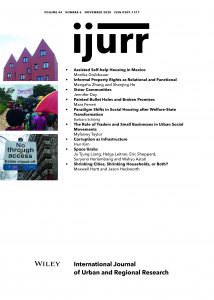Household size decline accounts for a substantial portion of population loss in shrinking cities, yet little research has focused on it. Much of the literature presents a simple growth/decline binary that is largely determined via population figures. In this paper, we highlight the importance and assess the impact of household size changes on population decline, and determine what types of household size declines are more acute in shrinking cities than other locales. We find that elderly households and households with school‐aged children are under‐represented in shrinking cities, while households with pre‐school‐aged children are over‐represented. More tellingly, we find the biggest source of household‐related loss in shrinking cities to be the growth of single‐person households now living in houses that were once home to entire families. These findings puncture the binary on which much of the shrinking cities discourse is based. The population dynamics of most cities are subtler than either practitioners or critical scholars assert. We argue that plans and development strategies for shrinking cities should reflect a range of demographic changes, including outmigration and internal household restructuring.
Details
Written by:
Maxwell Hartt & Jason Hackworth
Digital Object Identifier (DOI)
10.1111/1468-2427.12713
About DOI

